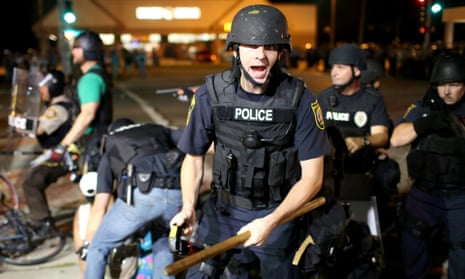It’s difficult to view citizens as partners when you’re looking at them through a Kevlar helmet and a riot shield – or when you have failed to build a culture of trust and then you add military equipment and tactics to a combustible mix of racial discrimination and little police accountability. This explosive combination makes policing significantly less effective, and dramatically less safe for everybody.
It’s no wonder so many cops – like some of those in Ferguson, Missouri – view their own community as the enemy when they spend their time geared for combat. It’s no wonder why they, in return, are viewed as an occupying force.
I was the city police chief during 1999’s so-called “Battle in Seattle,” the clash between anti-globalization protesters and my police officers. I realize now that the way we looked – and the way we behaved – provoked and exacerbated the violence. My decision to authorize the use of so-called “hard gear” (black uniforms with ballistic helmets and face shields, and the use of chemical agents) in our interactions with nonviolent, nonthreatening World Trade Organization demonstrators heightened tensions and put everyone – cops and citizens – at greater risk. The militarization of the WTO protests did untold damage to our efforts to build a positive, trusting partnership with our community.
I’m saddened to have watched the situation unfold in Ferguson and see almost none of the lessons I’ve tried to offer since then put into effect. It’s difficult to implement any best practices when the everyday relationship between a city’s cops and its citizens is so broken.
It may be too late to have prevented violence in Ferguson, but the community and others like it must come together now and make immediate changes to establish a baseline of behavior for law enforcement – to abide by today and to build upon for the future. The situation in Ferguson is no longer just about Michael Brown’s death: it’s about systemic racism and patterns of neglect, about leadership and the ability to influence angry, sometimes criminally motivated, individuals. Beyond the lifted curfews and long after the National Guard’s presence attempts to restore some semblance of peace, real accountability for everyone’s actions – cops and citizens – is imperative.
First, leaders in Ferguson need to put together a large, representative, credible crisis team to work with the police, communicate systematically with the community and, most importantly, elicit grassroots suggestions for resolution of the conflict. While some leaders have already tried to do this on an ad hoc basis, their work needs to be institutionalized and expanded to include others.
Thereafter, the city or state government should convene a group of citizens, officers, politicians and civic leaders to craft and quickly implement a statement of non-negotiable standards for the performance and conduct of each and every police officer: for example, any officer should be fired if found to be using racial or ethnic slurs or excessive force. Those local officials should create a citizens’ review board (and a process for filling it) and give it investigative authority and subpoena powers, rather than rely on the local prosecutor and police to investigate their friends and colleagues – rather than just waiting around for the US Department of Justice and FBI to complete their own independent investigations.
The Ferguson police department’s disciplinary system will need to be overhauled – with the oversight of the citizens’ review board – to created a dual-track system for police offenders: those found through an independent investigation to have made honest mistakes or have “routine” performance problems should be subject to corrective action (coaching, counseling, schooling); and those found to have engaged in willful misconduct, gross negligence or recklessness should be subject to punitive actions (up through and including dismissal and, in appropriate cases, criminal prosecution).
Meanwhile, the police department needs to immediately begin a process of demilitarization and replace the military model with a community policing model. As part of that, they should adopt the “Memphis model” of crisis intervention – requiring every employee to undergo a week of intensive training in defusing and de-escalation techniques conducted by mental health and communications experts. And they need to prohibit Swat operations for anything other than school shootings, armed hostage situations and other immediate crises when negotiations fail and lives are at stake. So should every police department in America.
It’s clear that Ferguson’s police officers, politicians and community leaders haven’t yet really embraced a philosophy of “community policing”, and that they weren’t working in partnership to identify and solve crime, traffic and other community-police problems – not with a police force that is 93% white in a city that is two-thirds black, or with a trove of military garb waiting in the wings. Some in the Ferguson area, like Missouri State Highway Patrol Captain Ron Johnson, understand the basics. But you can’t reverse the effects of years of military-style policing in a few hours of walking among protesters.
Still, law enforcement officers in Ferguson – and in so many other places – need to start somewhere. They need to start here ... or else they’ll just keep failing in all the same ways.
